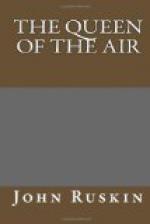110. He took pleasure in them because he had been bred among English fields and hills; because the gentleness of a great race was in his heart, and its powers of thought in his brain; because he knew the stories of the Alps, and of the cities at their feet; because he had read the Homeric legends of the clouds, and beheld the gods of dawn, and the givers of dew to the fields; because he knew the faces of the crags, and the imagery of the passionate mountains, as a man knows the face of his friend; because he had in him the wonder and sorrow concerning life and death, which are the inheritance of the Gothic soul from the days of its first sea kings; and also the compassion and the joy that are woven into the innermost fabric of every great imaginative spirit, born now in countries that have lived by the Christian faith with any courage or truth. And the picture contains also, for us, just this which its maker had in him to give; and can convey it to us, just so far as we are of the temper in which it must be received. It is didactic if we are worthy to be taught, not otherwise. The pure heart, it will make more pure; the thoughtful, more thoughtful. It has in it no words for the reckless or the base.
111. As I myself look at it, there is no fault nor folly of my life—and both have been many and great—that does not rise up against me, and take away my joy, and shorten my power of possession of sight, of understanding. And every past effort of my life, every gleam of rightness or good in it, is with me now, to help me in my grasp of this art, and its vision. So far as I can rejoice in, or interpret either, my power is owing to what of right there is in me. I dare to say it, that, because through all my life I have desired good, and not evil; because I have been kind to many; have wished to be kind to all; have wilfully injured none; and because I have loved much, and not selfishly; therefore, the morning light is yet visible to me on those hills, and you, who read, may trust my thought and word in such work as I have to do for you; and you will be glad afterwards that you have trusted them.
112. Yet, remember,—I repeat it again and yet again,—that I may for once, if possible, make this thing assuredly clear: the inherited art-gift must be there, as well as the life in some poor measure, or rescued fragment, right. This art-gift of mine could not have been won by any work or by any conduct: it belongs to me by birthright, and came by Athena’s will, from the air of English country villages, and Scottish hills. I will risk whatever charge of folly may come on me, for printing one of my many childish rhymes, written on a frosty day in Glen Farg, just north of Loch Leven. It bears date 1st January, 1828. I was born on the 8th of February, 1819; and al that I ever could be, and all that I cannot be, the weak little rhyme already shows.




